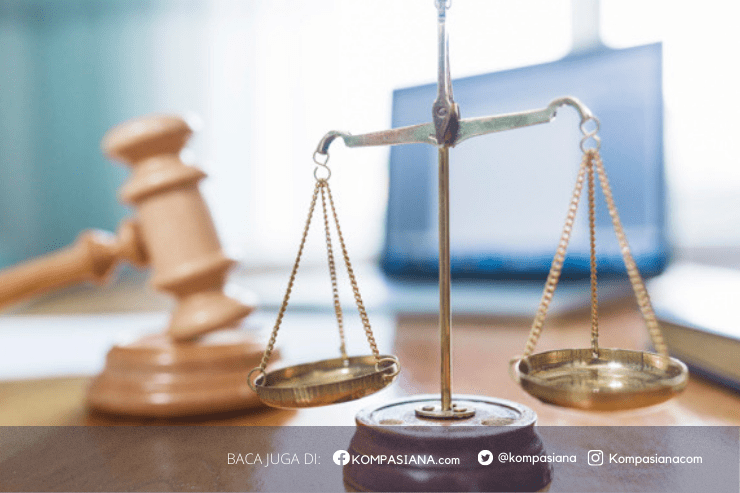In the end, the interpretation of state control over natural resources is in accordance with Article 33 of the 1945 Constitution of the Republic of Indonesia. The Constitutional Court in its Decision Number 001-021-022/PUU-I/2003 has interpreted the phrase state control over its natural resources, namely:
"...that the earth and water and natural resources contained within the jurisdiction of the state are essentially the public property of all the people collectively who are mandated by the state to control them to be used for the greatest possible prosperity. The people collectively were constructed by the 1945 Constitution giving a mandate to the state to carry out policies (beleid) and management actions (bestuursdaad), regulation (regelendaad), management (beheersdaad) and supervision (toezichthoudensdaad) for the purpose of the greatest prosperity of the people. The management function (bestuursdaad) by the state is carried out by the government with its authority to issue and revoke licensing facilities (vergunning), licenses (licentie), and concessions (concessie). The regulatory function by the state (regelendaad) is carried out through the legislative authority by the People's Representative Council (hereafter called DPR) together with the government, and regulation by the government (executive). The management function (beheersdaad) is carried out through a shareholding mechanism and/or through direct involvement in the management of State-Owned Enterprises or State-Owned Legal Entities as institutional instruments through which the state c.q. the government utilizes its control over the resources to be used for the great prosperity of the people. Likewise, the state supervision function (toezichthoudensdaad) is carried out by the state c.q. the government in the context of supervising and controlling so that the implementation of control by the state over important production branches and/or which controls the livelihood of the people is truly carried out for the greatest prosperity of the entire people."
The state's power over natural resources provides five functions which consist of the state having policies (beleid), the state having management actions (bestuursdaad), the state having regulation (regelendaad), the state having management (beheersdaad), and the state having supervision (toezichthoudensdaad). The policy function is carried out directly by the state, such as setting policies in oil and gas management. The management function carried out by the State as carried out by the government through its authority to issue authority in terms of licensing facilities, licenses, and concessions and at the same time can revoke these rights. Regulatory functions are carried out by the State such as the main authority of the state which is carried out through legislative authority through the House of Representatives with the Government and government regulations so that through regulation they can carry out their functions to improve people's welfare. The management function can be carried out through a share ownership mechanism, so that the government can be involved in the management of the company through a State-Owned Enterprise. In addition, the supervisory function can be carried out by the State or the government to supervise or control it, such as production branches which are important for controlling the livelihood of many people. created for the benefit of the people.
State sovereignty in national law, the phrase sovereignty which has been interpreted in the decision of the Constitutional Court Decision Number 001-021-022/PUU-I/2003, which means that the State has policies, management, regulation, management, and supervision as state sovereignty belonging to Indonesia can have a wide range which is broad and not limited to what will be done to its natural resources. This is contradictory with state sovereignty as regulated in United Nations Resolution 1803 (XVII). The State's sovereignty over its natural resources in United Nations Resolution 1803 (XVII) regulates the State's actions against expropriation of foreign property rights/Nationalization, with the provision of providing reasonable compensation.
Although there are differences in state sovereignty over natural resources, both nationally and internationally, the State can take nationalization actions because it is regulated in international law. Sovereignty in national law is broader in scope and can more freely use its functions which consist of supervision, management, administration, policies, and settings that have the same purpose.
Nationalization in Mining and Investment Law
Investment in Indonesian law is currently regulated in the Law of the Republic of Indonesia Number 25 of 2007 concerning Investment, along with its amendments which are part of the Law of the Republic of Indonesia Number 11 of 2020 concerning Job Creation. Investment law regulated after the issuance of Law of the Republic of Indonesia Number 25 of 2007 concerning Investment, the legal policy on investment is better because it no longer distinguishes between capital originating from abroad and capital originating from within the country.
The amendment to the Indonesian investment law which is part of the work copyright law has made it better because the considerations contained in the Law of the Republic of Indonesia Number 11 of 2020 concerning Job Creation has described the purpose, one of which is related to the sound of the point 'c'. It supports job creation that it is necessary to adjust various regulatory aspects related to the convenience, protection, and empowerment of cooperatives and micro, small and medium enterprises, and improvement of the investment ecosystem.
The investment law has been changed after the issuance of Law of the Republic of Indonesia Number 11 of 2020 concerning Job Creation. The existence of investment is increasingly being supported as a tool or goal of the state to realize the welfare of its people. The objectives are to ensure that every citizen gets a job, fair and proper remuneration and treatment in an employment relationship, as well as to make adjustments to various aspects of the arrangement relating to alignments, strengthening. Besides, it is also to make adjustments to various aspects of the arrangement related to improving the investment ecosystem, facilitating and accelerating national strategic projects oriented to national interests based on national science and technology guided by the ideology of Pancasila, contained in Article 3 of the Law of the Republic of Indonesia Number 11 of 2020 concerning Job Creation.
Then, related to the objectives referred above, the Government of Indonesia regulates the strategic job creation policy in achieving its goals, which includes improving the investment ecosystem and employment business activities, ease of doing business, research and innovation support, land acquisition, economic zones, and central government investment to accelerate national strategic projects. The improvement of the investment ecosystem and business activities includes the application of risk-based Business Licensing, simplification of the basic requirements for Business Licensing, simplification of sector Business Licensing and simplification of investment requirements.
After the changes in the investment law were made, 14 business fields were open to foreign investment which were previously closed. The business fields referred to are lifting of valuable objects from sinking shiploads, the manufacture of Chlor Alkali with Mercury, pesticide active ingredient industry, alcoholic beverage industry, wine-based alcoholic beverage industry, malt-containing beverage industry, operation of land transport passenger terminals, implementation of motorized vehicle weighing, the operation of shipping navigation facilities, and the Vessel Traffic Information System (VTIS), the operation of flight navigation services, the operation of motor vehicle type testing services and the operation of the radio frequency spectrum and orbital monitoring stations, as well as the operation of historical and ancient heritage tourism services (Alika, 2020).







